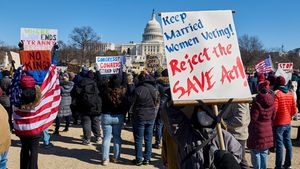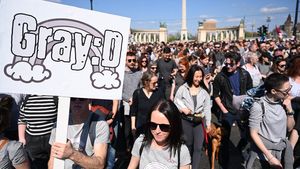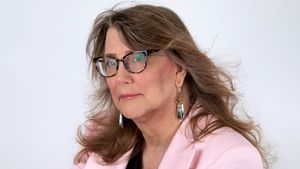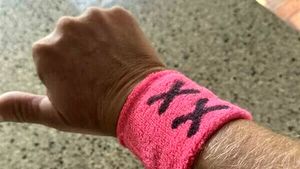2020 was set to be a big year musically for Ricky Martin. He'd come into it with a Latin American tour on the books, which started in Puerto Rico in January before he traveled to Argentina and Chile, then landed in Los Angeles. But when Gov. Gavin Newsom shut down the state of California with a shelter-in-place order in March, the rest of Martin's tour was postponed. As a result, the singer experienced something he never had in three decades of performing at sold-out arenas, on television, and more. He was hit with anxiety.
"I went through this mourning process of me letting go of the possibility of ever performing in front of 20,000 people again," Martin says in a Zoom call from his Los Angeles home. "That's what they were telling us. For me it was like, I don't know how to do anything else. I always thought I was going to be able to do this as long as I wanted to-- even if I looked ridiculous onstage at 70 years old with a cane, it was my option. But apparently that was no more."
And while he certainly can do other things, like acting, he found himself returning to music as catharsis.
Music has long been like religion to Martin, who began performing professionally as a preteen. When he was growing up, his mother had "thousands" of LPs, and the radio was always on at home. His maternal grandfather was a poet, penning witty lines, and Martin returns to that spirit with his own writing. This musical thread has has been woven into the home that Martin has built and maintains with his husband, artist Jwan Yosef, who the singer says has an "impeccable playlist" of music.
The pair married in 2017 and now have four children, two of whom Martin initially became the father to as a single parent in 2008. So, while in quarantine, saturated in this musical environment, listening to his own musical tastes as well as that of his children and his husband, Martin set about finishing the album--originally titled Movimiento--he had started nine months earlier.
 Coat: Berluti. Trousers: Berluti. Necklace: Joomi Lim. Bracelet 1: David Yurman. Bracelet 2: Dalmata
Coat: Berluti. Trousers: Berluti. Necklace: Joomi Lim. Bracelet 1: David Yurman. Bracelet 2: Dalmata
"I really finished it as a way for me to cope," he says. Instead of releasing one LP, though, Martin divided the project into two EPs, Pausa and Play. The first--Martin's first official EP--was released this summer and features ballads and collaborations with the likes of Bad Bunny, Residente, Sting, and Carla Morrison, the latter of whom Martin is slightly obsessed with.
It's the singer's "sound, her storytelling, her tone, the way she writes. I love her. I love her stories," Martin says of Morrison. The resulting music comes off emotional, as much of the project does. But with Play, which has yet to receive a release date but is expected out this fall, Martin wants fans to move again.
"I'm going to go deep into my beautiful Caribbean and I'm going to bring all my ancestors," he says. "I want to go to Brazil. I definitely want to go to Africa for the drums and the percussions. I want people to dance." But that is off in some distant future. Right now the star is still social distancing.
Martin has had a full house for much of the quarantine. There have been the six family members, an assistant, and Martin's mother. And while that may have made for a lot of good food from his mother, it's also made for a lot of hustle and bustle in their 11,000-square-foot mid-century modern abode in Beverly Hills. The two oldest children, Valentino and Matteo, have been homeschooled all of their lives and, now in quarantine, take karate lessons via Zoom. The two youngest, Renn and Lucia, are aged 1 and 2, and spend their days doing what babies do: sleeping, crying, and needing to be cared for. Martin has his music and Yosef his art. Juggling it all can be a Herculean effort.
"Listen, I became a daddy when I was 35; it's not the same thing when you're 48," the globally renowned multihyphenate performer says. "You need the energy! And I'm strong, trust me, I'm healthy--I'm carrying two babies at the same time and the stroller and the backpack--but it's a lot. It's a big responsibility."
Still, Martin can see a future where that family could expand.


Both wearing Shirts: Hanro. Trousers: Prada. Bracelet: David Yurman. Ring: David Yurman. Crown: Vauje
Though Martin and Yosef welcomed their fourth child (son Renn) into their family last October, they had announced that the family was expecting via surrogacy a month earlier at the 23rd Annual HRC National Dinner where Martin was picking up the National Visibility Award for his "bold voice that changes the world."
At the time, the singer remarked that he liked big families. After all, his grandmother had 14 children.
"Do I want that?" he asks on our call. "I would love to have many grandkids in the future and have every Sunday filled with family but, you know, we have to see what happens."
That choice is a combination of many things, Martin admits. On one hand, it's being responsible.
"There's moments where I want 10 more, and then there are those mornings where everybody's crying and I'm like, 'OK, maybe we're fine at six.'"
But it's also about the logistics of becoming fathers while being queer.
"Many years I dreamt of being a father, and many, many, many times I went through this grieving process of I am gay, I am a closeted gay man, and I'm not going to be able to be a daddy," he says of coming to surrogacy as his way of building a family. "Obviously adoption is an option and it's very beautiful, but unfortunately for gay men it's very difficult to adopt in some countries." That personal reality has dovetailed with a part of Ricky's life that's been present for as long as performing has been: his vocal activism and fight against human trafficking.
As Martin's story goes, he was 12 when he joined the Latin boy band Menudo. As a preteen he was touring and performing all over Latin America in what became a rigorous lifelong lifestyle. Five years into that, he stepped away from the group and broke out on his own. A 1998 World Cup performance broadcast to a reported 2 billion people turned him into a global star, and he's gone on to sell over 70 million records and bag two Grammys as a solo artist.
This comes in addition to the work he's done on television, appearing on General Hospital, among other shows, and getting an Emmy nomination for his role in Ryan Murphy's The Assassination of Gianni Versace: American Crime Story. In 2012, he performed at the Tony Awards in connection with his role in Broadway's Evita. He's a New York Times best-selling author and, in 2013, he even launched a community website to give parents and other caregivers tips and a space to share experiences about childrearing. But through it all, since almost the beginning, philanthropy and activism have been constants.
"The first thing we did [with Menudo] was we went to Brazil and we became ambassadors for UNICEF," he says. Martin maintains a relationship with the organization and was named a Goodwill Ambassador in 2003.
"I was only 12 years old and I was exposed to all these different realities that I didn't know existed," he recalls. And though, as he made his way into his teens, he would pause his involvement with social justice for a few years, he would later make his return.
In 2000, still at the height of his career, he launched the Ricky Martin Foundation, a child advocacy organization.

Turtleneck: Berluti. Trousers: Berluti. Necklace: Joomi Lim
"I got a call from a friend who was building an orphanage in India," he says of his beginnings in fighting global human trafficking. "I realized that what we're dealing with is modern-day slavery."
Martin's fight to protect these children from trafficking and abuse has, at times, put him in a catch-22 situation.
"I am an advocate for solid laws that will protect children, but just like I am a man with good intentions that is trying to adopt, there are many people out there with horrible intentions that just want to abuse children," he explains. "I am one of those that says, 'Yes, I want laws to protect children,' but at the same time I realize it's difficult for me to bring stability to this child living in an orphanage that has no one to visit him [because of those laws.] So it's kind of frustrating."
While the war he's waged against human trafficking has been the largest banner he's flown, Martin has continually used his platform, voice, connections, and resources for a variety of efforts, such as advocating for children around the world, addressing HIV, and assisting his native Puerto Rico. After hurricanes Irma and Maria, he helped to raise almost $5 million in assistance for the island. This summer, his foundation helped to quarterback an effort to fight the impact of COVID-19 there as well.
"If I don't do something, I'm allowing it to happen," Martin explains of his actions.
"If I have the platform that social media has given me to talk to 75 million people, it would be horrible not to talk about the things that people need to hear."
In addition to fighting the pandemic, Martin has also used his platform to speak out about the sometimes fatal oppression Black communities face. Last summer, Martin turned talk into action, going to Puerto Rico to help lead protests calling for the resignation of then Gov. Ricardo Rossello.

Coat: Balmain. Necklace; Joomi Lim. Crown: Vauje
Last July, 889 pages of messages from the app Telegram containing correspondence from the governor and his staff were published by the Center for Investigative Journalism. The texts contained profanity and were littered with misogynistic and homophobic slurs leveled at political foes and others. Martin says he and his family were the subject of some of the messages, and as a result he flew to the island and became a part of 15 days of peaceful protesting that saw a reported 2 million people gather in the streets, sometimes confronted by police in riot gear.
"We just can't take it anymore," Martin told a news broadcast at the time.
"Puerto Rico has suffered enough. We are tired, we can't take it!" Tired enough to do something. Days into the protests, photos went viral of Martin in the thick of the action, standing on the roof of a truck waving a massive Pride flag.
"I didn't know how big it was," he says, saying that a woman had pointed the flag out to him as it had been rolled up in the back of the vehicle. Martin picked up the flag and slowly started unrolling it, waving it back and forth.
As the rhythm picked up, so did his energy, and he found himself letting loose a string of curses. "It was one of those moments that the rage and the frustration was such that it just all came out. It was liberating," he says. Even recounting the story, the star shudders, and he holds his arm up to the camera to show goose bumps. The experience actually inspired Martin's music, and the performer filmed the music video for "Tiburones" on location there.
"For me, it was about me and everyone that came before me, waving that flag," he says. Days later, Rossello resigned.
"One thing that I'm going to always take with me is that after those days protesting, my kids would wait for me back home, and I knew that they will become revolutionaries because of the passion that we have towards social justice and fairness for all."

Photography: Fabian Guerrero. Stylist: Law Roach. Coat: Berluti. Trousers: Berluti. Necklace: Joomi Lim. Bracelet 1: David Yurman. Bracelet 2: Dalmata


































 Coat: Berluti. Trousers: Berluti. Necklace: Joomi Lim. Bracelet 1: David Yurman. Bracelet 2: Dalmata
Coat: Berluti. Trousers: Berluti. Necklace: Joomi Lim. Bracelet 1: David Yurman. Bracelet 2: Dalmata



























































